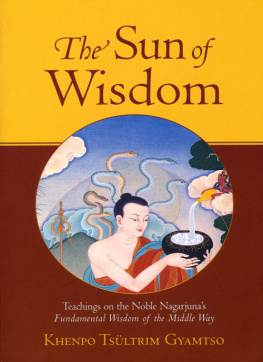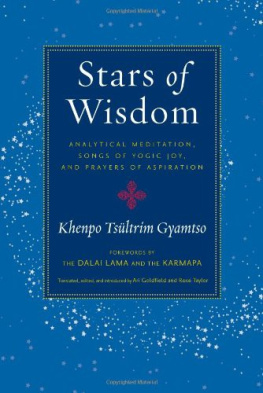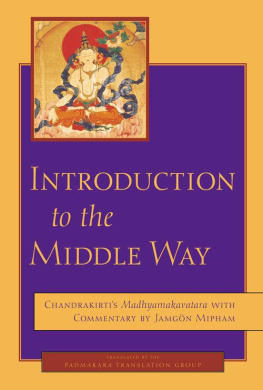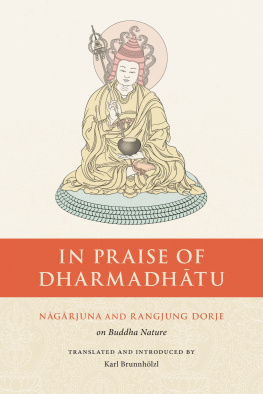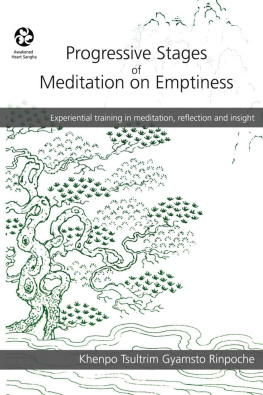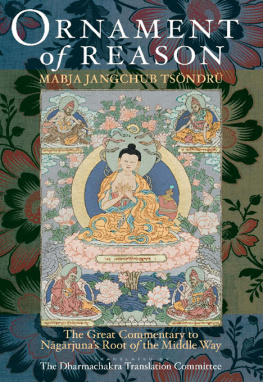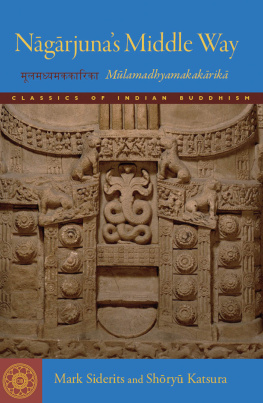Consummately readable... a unique combination of scholarly acumen and spirited engagement towards what might otherwise seem like dry and difficult material to the average reader.
Buddhadharma
ABOUT THE BOOK
The Fundamental Wisdom of the Middle Way was written in the second century and is one of the most important works of Nagarjuna, the pioneering commentator on the Buddha's teachings on the Madhyamika or Middle Way view. The subtle analyses presented in this treatise were closely studied and commented upon by many realized masters from the Indo-Tibetan Buddhist tradition.
Using Nagarjunas root text and the great modern master Ju Miphams commentary as a framework, Khenpo Tsltrim Gyamtso explains the most important verse from each chapter in the text in a style that illuminates for modern students both the meaning of these profound teachings and how to put them into practice in a way that benefits both oneself and others.
KHENPO TSTRIM GYAMTSO is a noted Buddhist scholar and teacher who was born in Eastern Tibet in 1934. Known for his highly engaging teaching style, he has traveled and taught in North America, Europe, and Asia from 1977 to 2007. He is the author of The Moon of Wisdom, Progressive Stages of Meditation on Emptiness, and numerous songs of realization.
Sign up to learn more about our books and receive special offers from Shambhala Publications.

Or visit us online to sign up at shambhala.com/eshambhala.
The Sun of Wisdom

Teachings on the Noble Nagarjunas Fundamental Wisdom of the Middle Way

KHENPO TSLTRIM GYAMTSO
Translated and edited by Ari Goldfield

SHAMBHALA
Boston & London
2012
Shambhala Publications. Inc.
Horticultural Hall
300 Massachusetts Avenue
Boston, Massachusetts 02115
www.shambhala.com
2003 by Khenpo Tsltrim Gyamtso
All rights reserved. No part of this book may be reproduced in any form or by any means, electronic or mechanical, including photocopying, recording, or by any information storage and retrieval system, without permission in writing from the publisher.
Library of Congress Cataloging-in-Publication Data
Khenpo Tsultrim Gyamtso, Rinpoche, 1934
The Sun of Wisdom: teachings on the noble Nagarjunas fundamental wisdom of the middle way/Khenpo Tsultrim Gyamtso.1st ed.
p. cm.
Includes index.
eISBN 978-0-8348-2540-6
ISBN 978-1-57062-999-0 (pbk.)
1. Nagrjuna, 2nd cent. MadhyamakakrikCommentaries. 2. Mdhyamika (Buddhism) I. Nagrjuna, 2nd cent. Madhyamakakrik.
BQ2797 .K54 2002
294.385dc21
2002152104
Contents


ON HIS TEACHING TOUR of Europe and the United States in 2000, Khenpo Tsltrim Gyamtso Rinpoche chose to explain the noble protector Nagarjunas great treatise The Fundamental Wisdom of the Middle Way I had the great fortune to serve as Rinpoches translator when he gave these teachings.
In response to the many requests from students that Rinpoches explanations of The Fundamental Wisdom of the Middle Way be published in written form, Rinpoche directed that this book be compiled from the teachings he gave on the text at three different Dharma centers: Tekchen Kyetsal in Spain, Karma Ling in France, and Karm Chling in the United States.
In the publication of this book, thanks are due first and foremost to Khenpo Rinpoche for giving these impeccable teachings in his inimitably masterful, lucid, warm, and humorous style, which students all over the world have come to appreciate so much. His kindness is immeasurable.
Many thanks also to Drupon Khenpo Lodr Namgyal and Acharya Sherab Gyaltsen Negi for their brilliant and patient word-by-word explanations in 1998 of Mipham Rinpoches commentary; to Elizabeth Callahan, Claudine Mona, Tingdzin tro, and the transcription staff at Karm Chling for graciously providing the tapes and transcripts of Rinpoches teachings, which served as the basis for this books contents; to Jim Scott for so expertly translating and arranging Jetsn Milarepas song of realization, An Authentic Portrait of the Middle Way, as well as most of the songs of realization that Khenpo Rinpoche quoted from during the teachings, which are reprinted in this book with only a few minor revisions that attempt to reflect the particular explanations Rinpoche gave of the songs at the time; and to Emily Bower, Joanne Burgess, Tracy Davis, Larry Mermelstein, and Claudine Mona for their most helpful editorial advice.
May all who read this book find it of some benefit to their understanding of the profound nature of genuine reality, and may the merit of that be a cause for all sentient beings to awaken into complete and perfect enlightenment. Until that happens, may everything be auspicious, and may the teachings of the genuine Dharma flourish in a world filled with happiness, harmony, and peace.
Ari Goldfield
Dharamsala, India
November 2001

WHATEVER ACTIVITY WE ENGAGE IN, our motivation is very important. According to the tradition of Mahayana (Great Vehicle) Buddhism, the motivation we should cultivate is bodhichittathe mind turned toward supreme enlightenment. One way to do so is to think first of our father and mother in this lifetime, and then extend the love and compassion we feel for them to all sentient beings, including even our enemies. It is the case that all sentient beings, including our enemies, have been our own father and mother countless times, and therefore they have been indescribably kind to us countless times. The greatest thing we can do to repay sentient beings kindness is to lead them all to the state of complete and perfect enlightenment, the state of buddhahood, and in order to do this, we must listen to, reflect upon, and meditate on the teachings of the genuine Dharma with all the enthusiasm we can muster. This is the supreme motivation of bodhichittaplease give rise to it as a first step whenever you read, reflect on, or meditate upon the teachings in this book.
The topic of this book is the text known as The Fundamental Wisdom of the Middle Way, composed by the noble protector Nagarjuna. Nagarjuna is a special teacher in the history of Buddhism. The Buddha himself prophesied that Nagarjuna would be born four hundred years after the Buddhas own passing and that he would give vast and perfect explanations of the Buddhas teachings. Nagarjuna fulfilled this prophecy both as a teacher of many students who went on to become great masters themselves and as an author of texts that expound and clarify the meaning of the Buddhas words. Buddhists and non-Buddhists alike have studied these texts from Nagarjunas time to the present.
Next page
